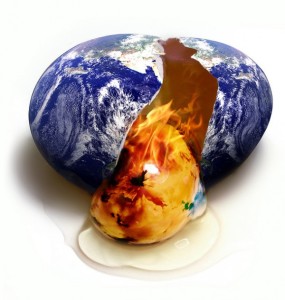Although the aim of Life at novelty, growth and richness of experience counters the forces of entropy, there are limits to the carrying capacity of the planet. […] However, reaching the limits of the planet’s carrying capacity does not necessarily entail an end to all growth, but is does require a change in the types of growth that occur so that the ecological sustainability rather than economic and population growth becomes our goal. — Paul Custodio Bube, Ethics in John Cobb’s Process Theology, p.97-98
One of the classes I took during my time at Claremont School of Theology was called “Seizing an Alternative: Toward an Ecological Civilization.” It was lead by Dr. Philip Clayton and Blake Horridge, and was part of the International Whitehead Conference of the same name this past summer. The premise of the class was that our current cultures of consumption and consumerism are unsustainable, and that we as religious leaders had to find ways to educate ourselves about the realities of this problem and re-think how we engage with people so as to help shift our respective communities away from self-destructive behavior and thought processes that are already wreaking havoc on a global ecological scale. The real problem, especially through the Western lens in the U.S., is the lack of comprehension that ecological disaster is inextricable from social, civil, and economic disaster.

For those of you reading this who think what I’m saying is a stretch, I would point you to this amazing comic done by Audrey Quinn and Jackie Roche, which outlines how climate change, and the subsequent prolonged drought in Syria, led directly to the downfall of what experts considered a stable government and has caused war, destruction, and the massive exodus of refugees from the area. If we do not shift away from a cultural, almost religious, obsession with consumerism and consumption without consequences, we will continue to contribute not only to the fall of other communities, but eventually our own. Our bubble of safety and prosperity is not impervious.
What I took away from the class — what I chose to be my practical manifestation of what I had learned into my work as a Unitarian Universalist minister — was the profound need for Earth-centered spiritual development in our religious lives as UUs. I am not someone who can organize community gardens, or petition the city to change laws about beehives and chickens and goats in urban homes. I struggle with how to get close to zero-waste living and how to be an effective minister to a congregation without using my car, or having to go into debt to buy one that is powered by sustainable energy.
What I do know is that I am surrounded by people who can do all those things, and much, much more. My job is to change the narrative we hear in congregations during our worship services from one of thoughtless abundance to one of cultivated sustainability. And I truly believe that narrative will come from our CUUPS members and from our relationships with indigenous cultures in our local communities.
Originally posted on the Patheos blog Nature’s Path.
Share this post: